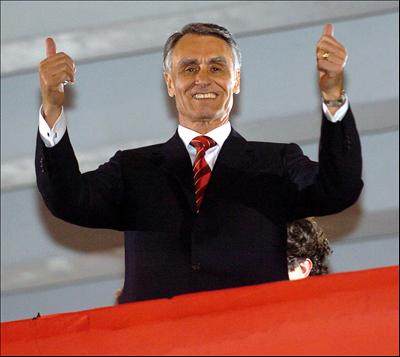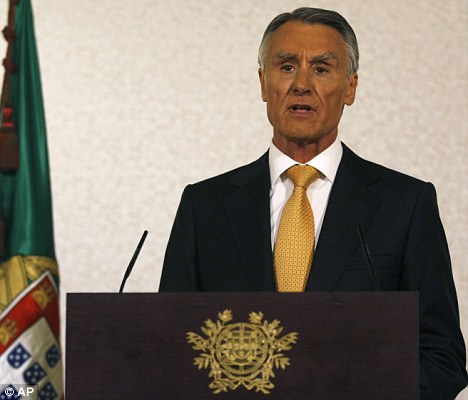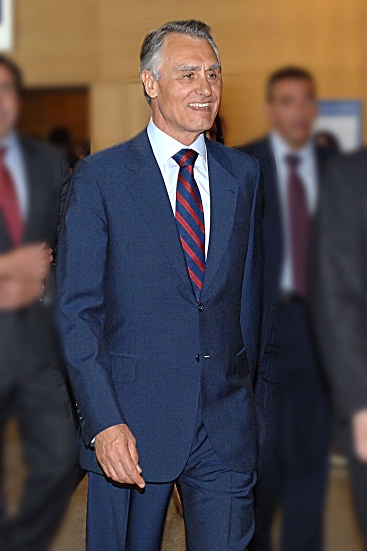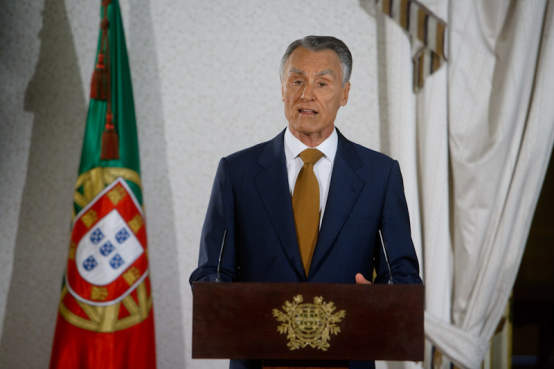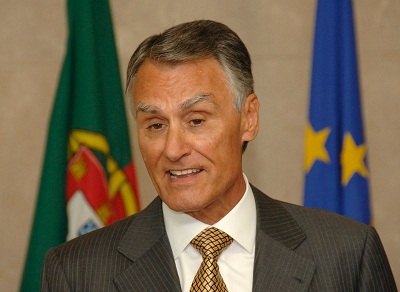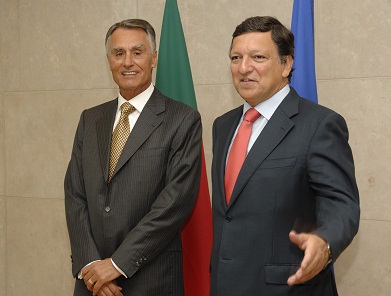<Back to Index>
- Mathematician Stephen Smale, 1930
- Painter Pyke Koch, 1901
- President of Portugal Aníbal António Cavaco Silva, 1939
PAGE SPONSOR
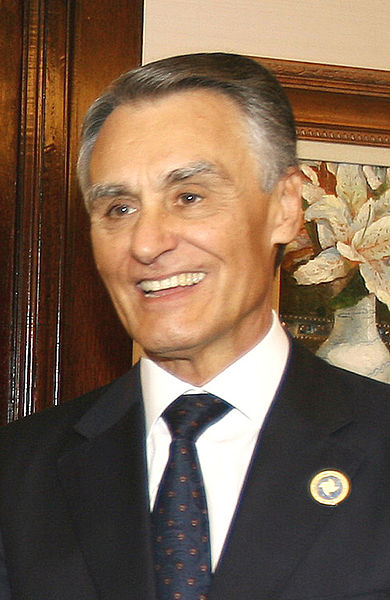
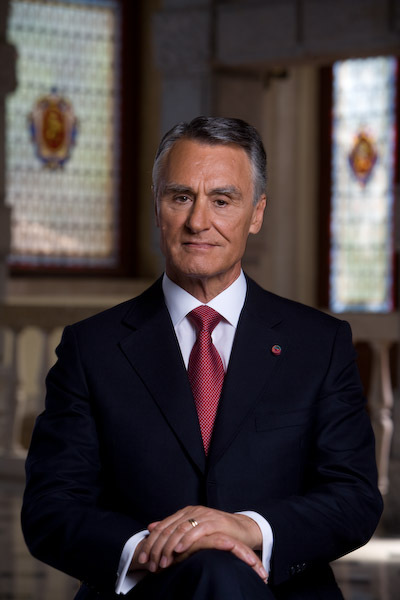
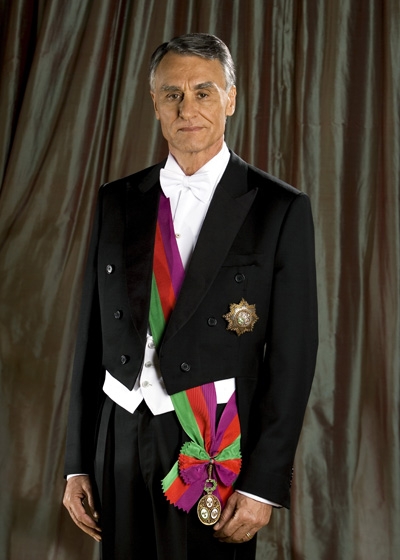
Aníbal António Cavaco Silva, GCC (born 15 July 1939), was the President of Portugal. He won the Portuguese presidential election on 22 January 2006 and was re-elected on 23 January 2011, for a second five year term. Cavaco Silva was sworn in on 9 March 2006.
He was previously Prime Minister of Portugal from 6 November 1985 to 28 October 1995. His tenure of ten years was the longest of any Prime Minister since Salazar,
and he was the first Portuguese Prime Minister to have won an absolute
parliamentary majority under the current constitutional system (which
was established after the country's redemocratization following the Carnation Revolution).
He was born in Boliqueime, Loulé, Algarve, the son of Teodoro Gonçalves Silva (Loulé, Boliqueime,
Maritenda, 30 August 1912 - 30 September 2007) and wife (m.
Loulé, Boliqueime, 4 March 1935) Maria do Nascimento Cavaco (b. Loulé, Boliqueime,
Maritenda, 27 December 1912), Aníbal António Cavaco Silva
was an undistinguished student at school. As a 13 year old, he flunked
at the 3rd grade of the Commercial School, and his grandfather put him
working on the farm as a punishment. After returning to school, Cavaco went on to become an accomplished student. Cavaco Silva then went to Lisbon enrolling at the Instituto Superior de Ciências Económicas e Financeiras de Lisboa (ISCEF) of the Technical University of Lisbon (UTL) (currently the Instituto Superior de Economia e Gestão (ISEG) of the Technical University of Lisbon), and obtained in 1963, with distinction, a degree in economics and finance (he scored a mark of 16 out of 20). While studying in Lisbon, Cavaco Silva was an athlete of CDUL athletics department from 1958 to 1963.
In 1964 he married Maria Alves da Silva, a lecturer in Germanic philology at the University of Lisbon, with whom he has two children (Bruno and Patrícia Maria), and took compulsory military service in the then Portuguese Overseas Province of Mozambique, as an official of military administration in Lourenço Marques (now the city of Maputo). His teaching career began in 1966 as assistant to ISCEF, but two years later Cavaco Silva went to the University of York, in the United Kingdom, where, in 1973, he was awarded a doctorate in economics. His thesis at York was a defense of (then popular) Keynesian economics (Neo - Keynesianism would influence his thought as Prime Minister later and he still self - identifies as a Neo - Keynesian). Returning to Portugal, he took up a post as assistant professor at ISCEF (1974), professor at the Catholic University of Portugal (1975), extraordinary professor at the New University of Lisbon (1979) and finally director of the Office of Studies at the Bank of Portugal.
He only became active in politics after the Carnation Revolution of 25 April 1974, later that year joining the then PPD, a political party headed by Francisco Sá Carneiro. Cavaco Silva, was appointed Minister of Finance by Prime Minister Francisco Sá Carneiro in 1980. He gained a reputation as an economic liberal, gradually dismantling regulations inhibiting free enterprise. He refused to serve in the Center Bloc coalition of Socialists and Social Democrats (PSD) that governed from 1983 to 1985, and his election to the leadership of the PSD on 2 June 1985, portended the end of the coalition.
Professor Cavaco Silva has published several academic works in economics, including in subfields like monetary policy and monetary unions.
The election that followed was complicated by the arrival of a new political party, the Democratic Renovator Party (PRD) formed by the supporters of the President, António Ramalho Eanes. In the 250 member Assembly of the Republic, the nation's legislature, the PRD won 45 seats - at the expense of every party except Cavaco Silva's PSD. Despite winning less than 30 percent of the vote and 88 seats, the PSD was the only traditional political party not to suffer substantial losses; its 88 seats, in fact, represented a gain of 13 over the previous election. Cavaco Silva became Prime Minister on 6 November 1985.
Tax cuts and economic deregulation and the arrival of EU funds spurred several years of uninterrupted economic growth, which increased Cavaco Silva's popularity. He was hampered, however, by heading a minority government. On most issues, his Social Democrats could rely on the 22 votes of the Social and Democratic Center Party (CDS), but the two parties' combined 110 votes fell 16 short of a parliamentary majority. The Socialists and Communists held 57 and 38 seats respectively; Cavaco Silva could govern if the 45 members of the PRD, who held the balance of power, abstained, as they frequently did. In 1987, however, the PRD withdrew its tacit support, and a parliamentary vote of no confidence forced President Mário Soares to call an early election.
The results of the election stunned even the most optimistic of Cavaco Silva's supporters. His Social Democrat party captured 50.2 percent of the popular vote and 148 of the 250 seats in the Assembly of the Republic. Far behind were the Socialists, with only 60 seats, and the Communists, with 31. The CDS and the PRD were virtually wiped out, left with only 4 and 7 seats, respectively. This was the first time since the 1974 revolution that a single party had won an outright majority in the national parliament.
The 1991 election was
another triumph for Cavaco Silva; it yielded a majority even larger
(50.6 percent) than the one of four years earlier. However, the 1993
European economic crisis, sparking a high unemployment rate, and the
country's mistrust of long spanning governments, eroded his popularity. He decided not to contest the 1995 election, and the PSD, lacking a leader of his stature, lost 48 seats and the election.
Cavaco Silva contested the 1996 presidential election, but was defeated by the Mayor of Lisbon, Jorge Sampaio, the Socialist candidate. Retiring from politics, he served for several years as an advisor to the board of the Banco de Portugal (Bank of Portugal), but retired from this position in 2004. He then became a full professor at the School of Economics and Management of the Catholic University of Portugal, where he taught the undergraduate and MBA programs.
He declined to support Pedro Santana Lopes, whom he branded as a mediocre politician, in the 2005 parliamentary election, despite pressure from within his party.
He is a member of the Club of Madrid and an honorary member of The International Raoul Wallenberg Foundation.
On 20 October 2005, Cavaco Silva announced his candidacy in the election, 2006. He was elected president on 22 January 2006 with 50.6% of votes cast, avoiding a run off. He is the first elected centre - right president in Portugal since 1974. He is also the second former Prime Minister to be elected president, following in the footsteps of Mário Soares.
He was sworn in on 9 March 2006. He is also the Head of the Portuguese Council of State.
Cavaco Silva's term was initially marked by a mutual understanding with the government led by Socialist José Sócrates, which he referred to as "strategic co-operation". He also avidly encouraged the suppression of partisan differences between the political parties in parliament, as a means of working towards the greater national good, despite the absolute majority held by the Socialist Party. This has led to several controversies, with some branding Cavaco Silva, a practising Roman Catholic and a self described believer in Fátima apparitions, as a traitor to the center - right and to some of his own personal beliefs. Nevertheless, this seems to have been a misconception with respect to his presidency. He has, in effect, resorted to his veto power more than Mário Soares, who as a President was largely seen as too conflicting with the Government, in the latter's first term.
The
most controversial moment of his presidency was when the Assembly of
the Republic passed a bill for the holding of a pre-legislative
referendum on the legalization of abortion in Portugal without any
restrictions in the 10 first weeks of pregnancy. After the
parliamentary approval of the bill summoning the referendum, Cavaco
Silva referred the matter to the Portuguese Constitutional Court, which
declared both the proposed legalization and the referendum
constitutional by a narrow 7 - 6 margin. Cavaco Silva, who could still
have vetoed the referendum bill, decided to sign it into law despite
pressure from some pro-life sectors, and thus allowed the referendum.
The majority of the Portuguese electorate abstained from the
referendum, but the vote for legalization prevailed among those who
chose to cast their ballot.
He married at the Church of the Monastery of São Vicente de Fora, São Vicente de Fora, Lisbon, on 20 October 1964 Maria Alves da Silva (b. Silves, São Bartolomeu de Messines, 31 October 1938), daughter of Francisco dos Santos Silva and wife Adelina de Jesus Pincho, with whom he has had two children.
President Cavaco Silva was invited to visit Spain by King Juan Carlos in March, through Prince Felipe. His visit was overshadowed by the announcement of Princess Letizia's pregnancy. During another visit, President Cavaco Silva received an honorary degree by the Goa University on 14 January. During an American visit, President Cavaco Silva plans to open an exhibition concerning Portugal's role in the discovery and convergence of diverse cultures, and to contact some Portuguese communities on the North American Eastern Seaboard, including the city of Fall River, Massachusetts, whose Portuguese descended population (43.9 percent at the 2000 census) is the highest of any municipality in the United States. Fall River features a replica of "The Gates of the City of Ponta Delgada" or "Portas da Cidade" in Portuguese.